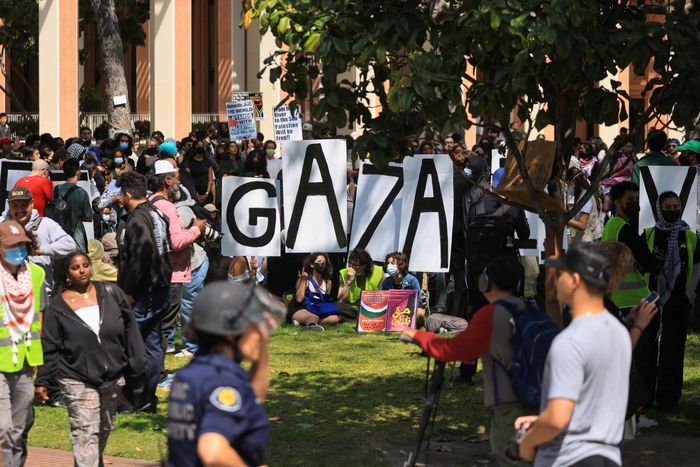In recent months, college campuses across the United States have witnessed a surge of protests and activism surrounding the Gaza-Israel conflict. The prominent aspect of these protests is the growing opposition among students and adults in the US providing aid to Israel and prolonging the war. As the nation grapples with its stance on international affairs, these demonstrations are not only shaping public opinion but also influencing the political landscape, particularly in the lead-up to the 2024 presidential election.
The Gaza-Israel conflict has been a long and divisive issue, as there have been cycles of violence and diplomatic relations. Since recent years, the United States has been a key ally and supporter of Israel, providing billions of dollars in military aid annually. However, this support has come under increased scrutiny, particularly in light of human rights violations and civilian casualties in Gaza.
“I don’t think it is a just generational view at this point,” said global politics senior Felipe Dominguez. “I think this war in Gaza causing youth protests and chaos is modern-day Vietnam war, and it is frightening if you really think about it.
On college campuses, students and adults alike are raising their voices against the U.S. government’s support for Israel and the continuation of the conflict. These protests are driven by a sense of outrage at the suffering of Palestinians in Gaza, as well as a growing awareness of the role that U.S. military aid plays in enacting and prolonging violence.
Additionally, many demonstrators argue that American taxpayer dollars should not be used to fund a conflict that violates international law and human rights principles.
“If I were not so caught up in my own life at the moment, I would most rightfully protest with everyone,” Dominguez said. “No amount of power or money would ever go before the lives of human beings. It is sickening that innocent people are used as pawns in a fight for power-starving countries who hold no morality.”
This issue has become increasingly politicized, particularly in the lead-up to the 2024 presidential election. Many adults see the war on Gaza as a focal issue that may affect both democratic and republican voters in the upcoming election, and if previous voters would even vote at all.
“The recent university protests truly show how divided we are as a nation,” said IB global politics teacher Angelica Strong. “It worries me that while we all may have our own opinions about the government and its affairs, society has turned against each other rather than working collectively to peacefully advocate for change. I believe that we will definitely see how these past two years of US foreign affair decisions really shape public opinion.”
Government party splits can be seen with the Democratic Party in particular. Progressive members of Congress, aligned with movements like the Boycott, Divestment, and Sanctions (BDS) campaign, are calling for a reevaluation of U.S. aid to Israel and a more balanced approach to the conflict and dissent. Meanwhile, more centrist Democrats are expressing concern about alienating a key ally in the region and the potential implications for U.S. national security interests and future international relationships.
“The nature of the recent protests show that the public, especially the youth, do not believe that their voices are being heard when advocating for political change peacefully,” Strong said. “Almost every large protest has turned to militancy or has made public interference of safety and well-being. I believe the current generation is losing faith in the current government.”
Polls show that a growing number of Americans, particularly younger generations, are questioning the wisdom of U.S. military aid to Israel and expressing support for Palestinian rights. This changing landscape has implications not only for U.S. foreign policy but also for the future of the Israeli-Palestinian peace process.
The college protests against aid to Israel and the Gaza-Israel conflict are emblematic of a broader movement for justice and accountability in U.S. foreign policy. As students and adults continue to raise their voices and demand change, they are sending a powerful message to policymakers and political leaders: it’s time for the United States to reassess its role in the Middle East and prioritize peace, justice, and human rights for all. As the nation looks ahead to the 2024 election, the Gaza-Israel conflict will remain a defining issue, shaping the contours of the political landscape and the future direction of U.S. foreign policy.








